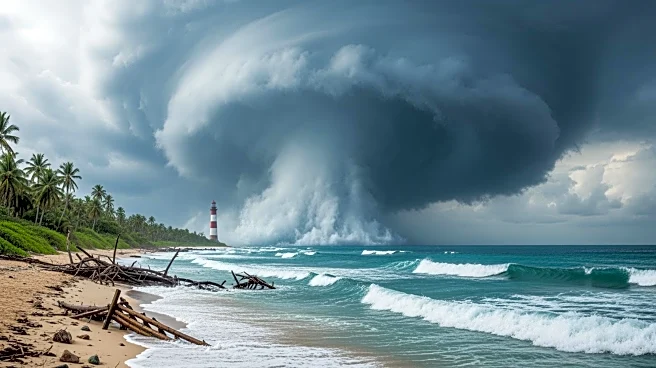What's Happening?
Hurricane Melissa has wreaked havoc across the Caribbean, particularly affecting Jamaica, where it made landfall a week ago with maximum sustained winds of 185 mph and gusts exceeding 200 mph. The storm
has resulted in widespread destruction, especially in western Jamaica, leading to a confirmed death toll of 32 in Jamaica, with additional deaths being verified. The hurricane has also claimed 31 lives in Haiti and two in the Dominican Republic, bringing the total death toll to 65, with expectations of it rising further. Efforts are underway to restore essential services such as electricity and water, which have been severely disrupted. Relief supplies and crews are arriving from various countries, including the United States, which has pledged $11 million in foreign assistance.
Why It's Important?
The impact of Hurricane Melissa is significant, as it highlights the vulnerability of Caribbean nations to extreme weather events. The destruction of infrastructure and disruption of essential services pose long-term challenges for recovery and rebuilding efforts. The international response, including aid from the United States, underscores the importance of global cooperation in disaster relief. The situation also raises concerns about the increasing frequency and intensity of hurricanes, potentially linked to climate change, which could have broader implications for disaster preparedness and resilience strategies in the region.
What's Next?
Jamaican officials are focused on confirming additional deaths and restoring services to affected areas. The international community continues to provide support, with relief supplies and crews arriving to assist in recovery efforts. The U.S. Department of State's financial aid aims to address immediate needs, such as emergency food supplies and water treatment systems. The ongoing situation may prompt discussions on improving infrastructure resilience and disaster response strategies in the Caribbean.
Beyond the Headlines
The devastation caused by Hurricane Melissa may lead to increased scrutiny of climate change impacts on hurricane patterns, prompting further research and policy discussions. The ethical dimension of disaster response, including equitable distribution of aid and support for vulnerable communities, is also a critical consideration. Long-term recovery efforts will need to address not only physical rebuilding but also the psychological and social impacts on affected populations.











